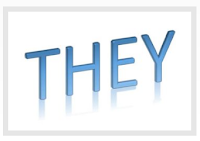We editors should all listen to our authors when they tell us how their names should appear on what we edit.
I think that in the USA it's purely privilege—both white privilege and male privilege—that causes the gatekeepers in English-language publishing systems to tell any authors with two surnames that they're doing it wrong. Grrrrrrrrr!
"Now I needed to ask [the committee member] the question that had been nagging me since I began to work on the manuscript: 'How should I publish my name?' 'However you want,' she replied. 'It is time for people to understand that Latin American scientists have two last names.' ...
" 'Two last names are too much for 'them' to handle, and they will butcher them anyway,' my Latin American friends say when explaining why they hyphenate or use a single last name for their publications. ... This is not an isolated issue for Latino and Hispanic scientists; it also affects members of other groups whose names do not conform to a 'first-name last-name' norm. And insisting on being able to present our names as we choose is not 'picky' or 'capricious.' It is a matter of respect for our identities as scientists and as citizens of the world. ...
My mate and I encountered this "you're doing it wrong" attitude in the 1990s. When he and I married in 1993, we decided to both hyphenate our surnames. Before marriage, my surname was O'Moore, and his was Klopf. So we both took the surname O'Moore-Klopf. Now, we're privileged white people, yet he still caught grief for the first few years that he had the new surname, because, you know, "men don't hyphenate"! That annoyed both of us so much. All these years later, we have two grown sons who inherited the surname O'Moore-Klopf.
"When in doubt, ask scientists how they would like to be addressed. When you cite their work, check their previous publications, their ORCID account, and their web pages. Next time you add a paper to your reference manager, double-check the author line to ensure the system has imported it correctly. Above all, make sure researchers from all backgrounds have the opportunity to claim their identities and feel validated in their workplaces."








